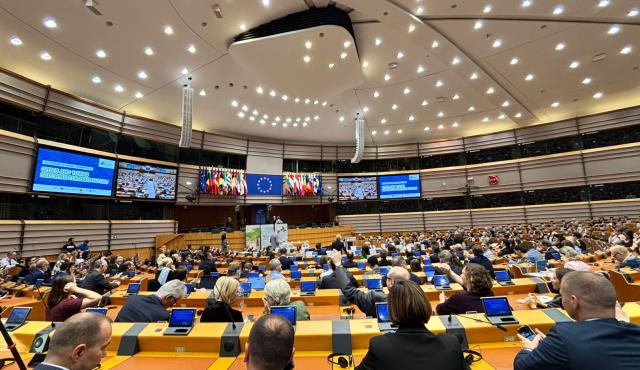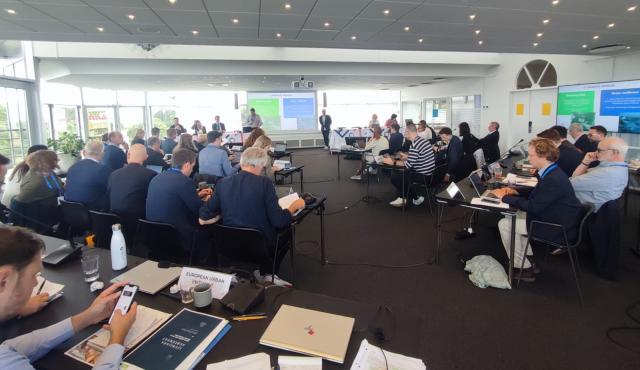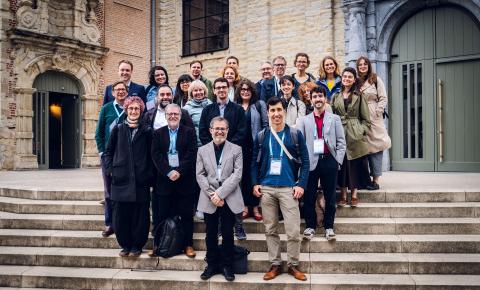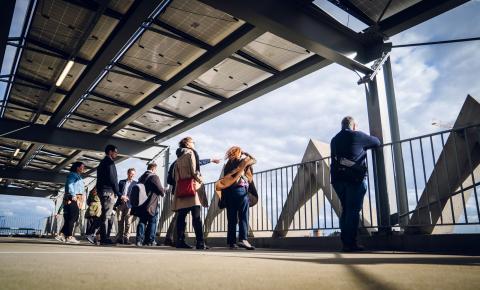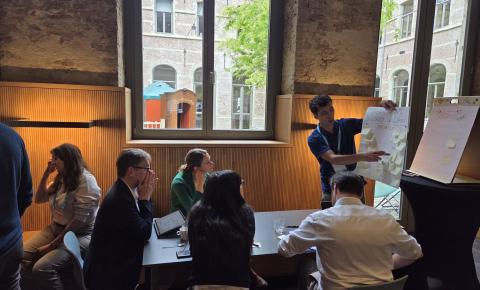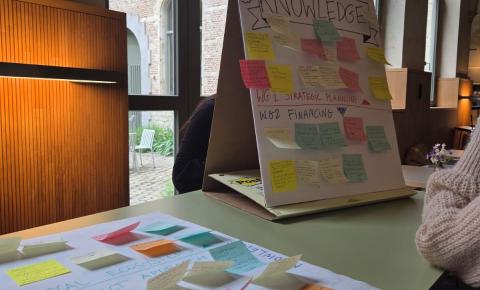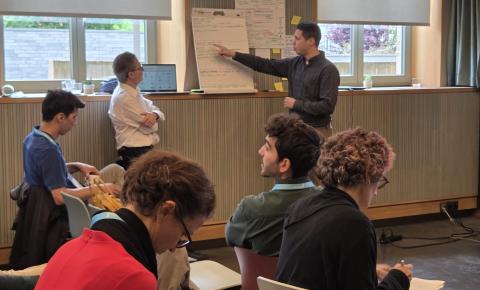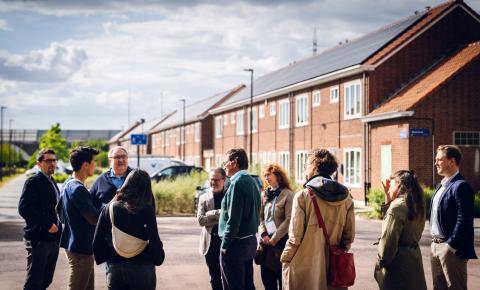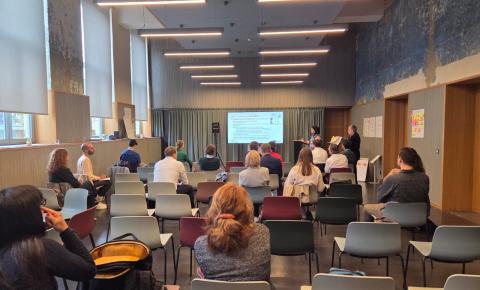Building Decarbonisation
News
About the Partnership
Launched in November 2024, the Urban Agenda for the EU Building Decarbonisation Partnership addresses decarbonisation of buildings through a strategic integrated approach, going beyond individual buildings by encouraging the district/neighbourhood approach and making full use of the provisions in the revised directives. Local heating and cooling plans are among the important steps towards decarbonisation of buildings. This approach could be linked with the development of district heating, the development of energy communities and energy sharing and explore the possibilities of the Electricity Market Design reform. To put these objectives in practice, it is important to develop strategies and plans at the local level.
The Partnership is composed of 26 partners representing national and regional authorities, urban authorities, European umbrella organisations, other stakeholders, and the European Commission.
Thematic Focus
From January to June 2025, the Partnership undertook an intensive collaborative process to define the thematic focus of this Orientation Paper. Building on the findings of the Ex-Ante Assessment, a series of focused sessions and working meetings, both online and in-person, enabled the identification and consolidation of key areas where coordinated urban action can generate tangible impact. As a result of this collective effort, four thematic areas were identified: Strategic Planning at Municipal Level, Financing Building Decarbonisation, Collaboration for Local Ecosystems and Implementing Projects at District/Neighbourhood Level.
The Orientation Paper specifies the potential outputs and expected impacts of each thematic area, as well as the contributions of each theme to the three UAEU pillars (Better Funding, Better Knowledge, Better Regulation).
This process has laid a solid foundation for the next phase: the design of the Action Plan.
Strategic Planning at Municipal Level
This Working Group will support municipal strategic planning by mapping existing legislation and planning requirements and assessing how they interact across levels of government. It will then provide recommendations to improve regulatory coherence, helping local authorities drive building sector decarbonisation across Europe.
Financing Building Decarbonisation
The Financing Building Decarbonisation Working Group develops and promotes strategies to fund city-wide building decarbonisation. It develops ways of improving municipal capacities for running integrated district approaches, aligns investments with urban regeneration and local energy strategies, explores the potentials of alternative financing methods (e.g. on-bill, carbon credits, land value capture), and strengthens municipal fiscal capacity (taking into consideration tools like green bonds and public-private partnerships). A key focus is on ensuring municipal resources for integrated renovation approaches, just and affordable finance, especially for vulnerable households, while considering energy price dynamics.
Collaboration for Local Ecosystems
This group will explore how cities can lead building decarbonisation by working as part of dynamic local ecosystems. It will focus on stakeholder engagement, data-driven decision-making, and multi-level cooperation. Through system mapping, capacity building, and co-created strategies, the group aims to align local actions with EU climate goals, close policy gaps, and foster inclusive, place-based solutions that are practical, scalable, and rooted in local realities.
Implementing Projects at the District/Neighbourhood Level
Integrated district approaches for the decarbonisation of buildings offer a number of strategic, technical, and economic advantages over building-by-building efforts. Experience in district/neighbourhood approaches exists from ongoing and previous EU funding periods. This group will focus on how EU structural and cohesion funding can better support district and neighbourhood-level decarbonisation, especially in small and medium-sized cities. It is equally important to explore how integrated district approaches should be designed and implemented to ensure effective and efficient decarbonisation which includes developing appropriate working structures and instruments to engage building owners and other local stakeholders. Building on past experiences, the group will provide recommendations for future Cohesion Policy and explore ways to mainstream and scale up local projects that contribute to reducing carbon emissions in the built environment.
This Working Group will support municipal strategic planning by mapping existing legislation and planning requirements and assessing how they interact across levels of government. It will then provide recommendations to improve regulatory coherence, helping local authorities drive building sector decarbonisation across Europe.
The Financing Building Decarbonisation Working Group develops and promotes strategies to fund city-wide building decarbonisation. It develops ways of improving municipal capacities for running integrated district approaches, aligns investments with urban regeneration and local energy strategies, explores the potentials of alternative financing methods (e.g. on-bill, carbon credits, land value capture), and strengthens municipal fiscal capacity (taking into consideration tools like green bonds and public-private partnerships). A key focus is on ensuring municipal resources for integrated renovation approaches, just and affordable finance, especially for vulnerable households, while considering energy price dynamics.
This group will explore how cities can lead building decarbonisation by working as part of dynamic local ecosystems. It will focus on stakeholder engagement, data-driven decision-making, and multi-level cooperation. Through system mapping, capacity building, and co-created strategies, the group aims to align local actions with EU climate goals, close policy gaps, and foster inclusive, place-based solutions that are practical, scalable, and rooted in local realities.
Integrated district approaches for the decarbonisation of buildings offer a number of strategic, technical, and economic advantages over building-by-building efforts. Experience in district/neighbourhood approaches exists from ongoing and previous EU funding periods. This group will focus on how EU structural and cohesion funding can better support district and neighbourhood-level decarbonisation, especially in small and medium-sized cities. It is equally important to explore how integrated district approaches should be designed and implemented to ensure effective and efficient decarbonisation which includes developing appropriate working structures and instruments to engage building owners and other local stakeholders. Building on past experiences, the group will provide recommendations for future Cohesion Policy and explore ways to mainstream and scale up local projects that contribute to reducing carbon emissions in the built environment.
Members
By clicking on the symbol , in the top left corner, you will be able to see the different layers of this map.
National authorities
MIVAU (Ministry of Housing and Urban Agenda) (ES)
Regions
Department of Environment & Spatial Development Flanders (BE)
South Moravian Agency for Public Innovation (CZ) - [Active until August 2025]
Catalan Land Institute (INCASÒL) (ES)
Cities (Urban Authorities)
- City of Mechelen (BE)
- City of Milan (IT)
- City of Vaasa (FI)
- City of Kladno (CZ)
- City of Bytom (PL)
- City of Bergisch Gladbach (DE)
- Municipality of the City of Baja County (HU)
- Cesis Municipality (LV)
European/ national city umbrella organisation
- Eurocities
- Council of European Municipalities and Regions - CEMR
- German Association for Housing, Urban and Spatial Development (DE)
Other stakeholders
- Green Building Council España (ES)
- Green Finance Institute España (GFI España) (ES)
- USE Efficiency Association (UniverCities) (IT)
- Hungarian Energy Efficiency Institute (HU)
European institutions
- European Commission Directorate-General for Energy (DG ENER)
- European Commission Directorate-General for Internal Market, Industry, Entrepreneurship and SMEs (DG GROW)
- European Commission Joint Research Centre (JRC)
- European Commission Directorate-General for Structural Reform Support (DG REFORM)
- European Commission Directorate-General for Regional and Urban Policy (DG REGIO)
- European Commission Directorate-General for Climate Action (DG CLIMA)
Documents
EUI - Call for City-to-City Exchanges
The call for City-to-City exchanges is open on a continous basis.
Check the details and apply to benefit of other city experiences to tackle your sustainable urban development challenges.
The Festival of the New European Bauhaus
The European Commission organises the third edition of the New European Bauhaus Festival in Brussels (Belgium) on 9-13 June 2026, and you can be part of it!
Get involved and help shape the next Festival! Apply by October 15, 2025.
